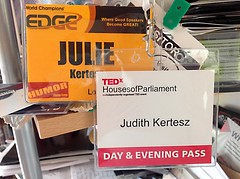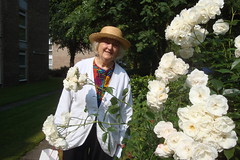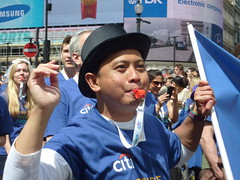New goals or aspirations, new directions ?
Continuing, finding new dreams.
Weather I achieve them or not, I can try.
Speak better, find a message, deliver the message so many could be inspired by it.
Judy Carte's book, DVD's and perhaps even coaching, and all I can learn to become better, can lead eventually towards a TEDx speech. Not a political one in Parliement, but there are many others nowadays. So perhaps, it is not such an 'impossible dream' as it seems for the moment. At any way, dreams keep alive.
Arrived from Paris at age 73, I love London diversity, warmth and opportunities, soon 80.
Monday, July 22, 2013
Sunday, July 21, 2013
Write, read / speak, listen
Recently, I stumbled on two books by Adler, written at 40 years of distance. One about 'how to read' : different ways of reading in 1940.
Skimming, absorbing, active participative reading. There is so many kind!
Even when I read for enjoyment 'only' it is never only that, even then I like to read with a pen in my hand or underscore on kindle, the passages I like, and sometimes, writing passages I particularly enjoy in my notebook.
Ten years ago, I was reading picking out the English words I did not understand, nowadays more expressions I want to remember. Later, I used to look up, make a list, try to learn by playing and putting the words in some other context, phrase. And of course, these days, to use the expressions in one of the stories I tell.
All my life, at least from 7 years on, I lived with books and stories they told, wisdom they told me directly or defused in a tale. Some from far away still stick with me as do my great grandmothers family stories. Or my fathers, like I lived them, was there.
It was never one way only! I participated, felt I was there.
Adler, wrote 40 years later, wrote about the importance of listening. Speaking / listening. Really communicating. Did not read yet the beginning of that one, his books are a bit heavy to read, but I am sure there is wisdom to ponder in them. For the moment, the importance of listening, while we speak, or while we participate to a talk. And also, the difference between writing and giving a speech.
Skimming, absorbing, active participative reading. There is so many kind!
Even when I read for enjoyment 'only' it is never only that, even then I like to read with a pen in my hand or underscore on kindle, the passages I like, and sometimes, writing passages I particularly enjoy in my notebook.
Ten years ago, I was reading picking out the English words I did not understand, nowadays more expressions I want to remember. Later, I used to look up, make a list, try to learn by playing and putting the words in some other context, phrase. And of course, these days, to use the expressions in one of the stories I tell.
All my life, at least from 7 years on, I lived with books and stories they told, wisdom they told me directly or defused in a tale. Some from far away still stick with me as do my great grandmothers family stories. Or my fathers, like I lived them, was there.
It was never one way only! I participated, felt I was there.
Adler, wrote 40 years later, wrote about the importance of listening. Speaking / listening. Really communicating. Did not read yet the beginning of that one, his books are a bit heavy to read, but I am sure there is wisdom to ponder in them. For the moment, the importance of listening, while we speak, or while we participate to a talk. And also, the difference between writing and giving a speech.
Saturday, July 6, 2013
Margo healing
Take the picture here, with the flowers, Margo told me.
She looks so much better then three years ago!
Her cancer did not disappear, but instead of medical treatment, being active and feeling well in her skin, helps her a lot more.
I am so happy for her - and have high hopes for myself. Laughter, comedy will help me fight and put it farther away, too. Whatever comes.
She looks so much better then three years ago!
Her cancer did not disappear, but instead of medical treatment, being active and feeling well in her skin, helps her a lot more.
I am so happy for her - and have high hopes for myself. Laughter, comedy will help me fight and put it farther away, too. Whatever comes.
Thursday, July 4, 2013
Speak & Deliver - A Public Speaking Blog For the Speaking Public: What Came First, the Story or the Point?
Speak & Deliver - A Public Speaking Blog For the Speaking Public: What Came First, the Story or the Point?: "I have this great story - I just have to find a way to tell it!" There are many phrases that make me internally cringe when...
reproduced from : Speak & Deliver - A Public Speaking Blog For the Speaking Public (subscribe to it!) lots of good advice! |
|
Posted: 03 Jul 2013 07:06 AM PDT
There are many phrases that make me internally cringe when I hear them from a speaking client - and this is in my Top 5 - it's right up there with 'I know you suggested I do this, but my MOM says..." Invariable, the story has nothing to do with the speech they are trying to build, but they are determined to shoehorn it in, because it's cute, funny, or personally important, but not pertinent in anyway to what they are already trying to say in their speaking life. Make no mistake - I love stories. Stories are crucial for connecting with the audiences. Stories will be what people remember. Stories are, oh, forget it, I have no idea what metaphor to use this morning. Suffice it to say, stories are important, and I wouldn't want to listen to a speaker who didn't use them. But no matter how great your story is, if it doesn't match the point you're trying to get across, it's nothing more than a diversion, and in the worst cases, can completely derail your speech. Because most of us love to hear and tell stories, this is an easy trap to fall into. When we're just learning to speak, we're told - "Just get up there and tell a story". Toastmasters, much as I love them, fall prey to this easily, as they are encouraged to come up with a different speech every month, which puts them into a position of starting their speech with a story, and then, if they're really good at what they do, finding the point within the story to provoke their audience. When you're learning, this is a fine approach. When you're ready to get out into the real world, it's a trap. You can't get in front of an audience and just string together a few stories and hope to get by and speaking skills and charm. They might say they loved it, and they might have actually enjoyed the presentation, but it doesn't mean anything you've said, or anything about YOU, will stick with them beyond the next 30 minutes. Building a speech for the real world means having a real point to share. Granted, it may start with a story you want to tell - surviving abuse, climbing Everest, passing the 400th level of Candy Crush - but ultimately it must have a takeaway point - a spine on which the muscle of your stories can always attach. Which means that the 'story you just have to find a way to tell' may not work. I don't care how funny it is. I don't care if it makes me cry. All your audience really cares about is 'does this matter' - otherwise known as, 'why is this important to me, or the reason I'm here?' If you're building a keynote - start with your point. Then support the point with stories. Even if your next speech is 'Organize Your Speech' in the basic Toastmasters manual, consider starting with your point, and building the speech around it, finding supporting material from your life and the world around you - it'll be a tougher exercise than simply ranting about your day, but you, and your audience, will get more out of it when all is said and done. And even if you are sitting there saying - 'But Rich, I have a great story to tell' - STOP. Tell me why you want to tell it, and more importantly why I need to hear it. Does it support the message you're already delivering? Does it have a point that is important enough to build a new speech around? Or is it simply an indulgence, hanging there, tempting you to take your audience on a detour from which they may never return? Find your point, then your story, and you'll be well on your way as you Speak....and Deliver! |
| You are subscribed to email updates from Speak & Deliver - A Public Speaking Blog For the Speaking Public To stop receiving these emails, you may unsubscribe now. | Email delivery powered by Google |
| Google Inc., 20 West Kinzie, Chicago IL USA 60610 | |
Wednesday, July 3, 2013
Julie Stands UP
Director: Irene Fernandez
15 minutes
A short portrait of Julie Kertesz, an 80-year-old woman who decided, in her late 70s, to take up stand-up comedy. Originally from Hungary and a French citizen, Julie Kertesz moved to London 5 years ago.
Julie’s stand-ups not only defy preconceived ideas about ageing but also communicate the power of creativity as a means to deal with the past, present and future. Her journey became a path of self-discovery, empowerment and self-realisation.
Screening: Friday 5th July / 6:30 pm
New Academic Building, Goldsmiths College
New Cross, London SE14 6NW
Monday, July 1, 2013
Gay Pride London 2013 and portrait workshop
There are roules, and i tried to think about them: give an uniforme background to thé portait.
Other times, you go against the rule.
In this case, the similar blue backgrounds, even add more. Reinforcing and bringing the eye back.
So many pictures, I tried in each to convey the impression they gave me. As much as possible.
Some, like this one candid, and others, taken after permission was asked. Mainly out of the parade, or just with a nod of head.
Looking at my 100 pictures, 80 already on Flickr, I realised I am more 'documentary' photograph then 'portrait' or 'street portrait.
In any case, why give an etiquette? Why put photographers in a box?
Other times, you go against the rule.
In this case, the similar blue backgrounds, even add more. Reinforcing and bringing the eye back.
So many pictures, I tried in each to convey the impression they gave me. As much as possible.
Some, like this one candid, and others, taken after permission was asked. Mainly out of the parade, or just with a nod of head.
Looking at my 100 pictures, 80 already on Flickr, I realised I am more 'documentary' photograph then 'portrait' or 'street portrait.
In any case, why give an etiquette? Why put photographers in a box?
Subscribe to:
Comments (Atom)




